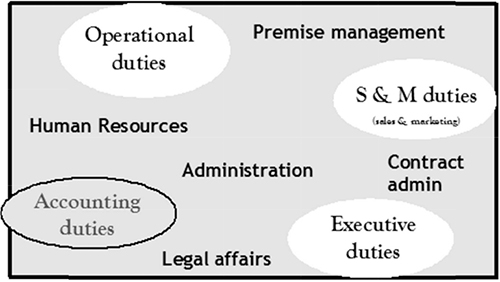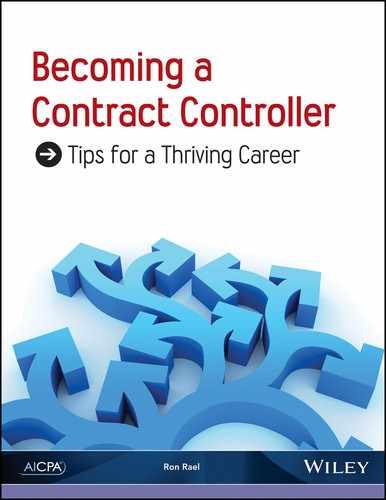Chapter 1
Controller Responsibilities
Introduction
What is a Controller? Do they really control anything?
To fully understand the role of the contract controller, we need to set a baseline of knowledge about what the controller position is all about. This position is different from the CFO, which is covered in chapter 2.
This chapter helps you to
Understand the role the Controller plays in an organization.
Avoid getting sucked into the Controller’s Vacuum.
Help another professional decide if the role is one they really want to get involved with.
The Controller Position
An experienced Controller described his job as:
“Do everything!”
A seasoned Controller commented that her entire job description reads:
“All duties as assigned.”
The best way for a non-Controller to understand what a Controller does is to hear how many Controllers describe their job:
“A Controller has full responsibility for everything not specifically assigned to other executives.”
We begin understanding the contract Controller position by conducting a brief review of the Controller position. This is for two reasons. First, some people who are interested in this position come from public accounting and most have never served as Controller. This brief review gives them a better understanding of what responsibilities the Controller takes on so they can successfully scope out the client’s project.
The second reason for this review is for people working in industry who have never been a Controller but are considering becoming a contractor. They want and need to know which responsibilities to accept and which to avoid.
The biggest understanding you will get from this review is being able to avoid getting sucked into the Controller’s Vacuum.
Avoid the Controller’s Vacuum
The Controller’s Vacuum, a term that I coined to describe this phenomenon, is something that the Hired Gun must avoid at all costs. If you get sucked into this vacuum, I guarantee you will not be successful in the role as a contract professional. The vacuum is depicted in figure 1-1.
Figure 1-1: How Our Responsibilities Grow

Figure 1-1 represents all the major responsibilities in a typical organization. There are normally specific executives responsible for marketing, production, and sales. You are hired to take over the traditional accounting duties—cash management, receivables, payables, payroll, internal controls, bank relations, and debt management.
But then:
“Since you handle payroll could you also take care of our human resource issues? We do not have anyone supervising the administrative personnel so could you take this on? Will you work with the attorneys on this complex legal issue? Could you make sure that we are in compliance with these government contracts? Employees are worried about building security. Would you look into it? Would you please handle the move to our new location since I do not have the time?”
Because you care and you have the expertise, you say “yes” to each of these requests. You just got sucked into the Controller’s Vacuum! We quickly fill in all the shaded responsibilities.
Controllers traditionally end up being responsible for everything else not specifically assigned to other managers. Some Controllers manage all or part of operational areas in addition to the traditional finance and administration duties.
Now this is not true in large corporations, but you will not be hired as a contract Controller for Microsoft or IBM. The need for this role is in smaller companies that have executive or management teams of less than ten people.
The extensive responsibility borne by today’s Controller creates a major problem for the contract or part-time Controller. Most Controllers work more than 50 hours every week and rarely achieve the feeling of “being caught up.”
Therefore, you must avoid being asked to take on the entire workload borne by the full-time incumbent Controller. You can do so by understanding exactly what the client needs then agreeing only to fill that specific role or need. Later in this book, you will be given a tool titled the Position Description (exhibit 5-1), which will help you identify the proper role that matches the client’s need to your expertise.
The Role of the Controller
A good place to start is to define the niche the Controller fills in most organizations.
Major Roles of a High Road Controller
The major roles of a Controller include
Being the internal financial consultant.
Serving as the conscience for business ethics.
Ensuring the control system works.
Informing the employees, executives, and owners on how the company is doing financially.
Keeping interested third parties supplied with adequate information.
Being the main contact with bankers, investors, advisors, and government agencies.
Adding value by making overhead functions cost effective and fully supportive, while ensuring efficiency in the supply chain.
Being a positive role model and forceful leader.
Providing insight and suggest courses of action.
In the next chapter, the role of the Controller is compared and contrasted against the role of the CFO.
BE THE INTERNAL FINANCIAL CONSULTANT
People within the organization look to you as their primary resource. They are always turning to you to get questions answered and problems solved. We love to do this; yet it is a very time consuming and open-ended responsibility.
SERVE AS THE CONSCIENCE FOR BUSINESS ETHICS
In addition to being responsible for the internal controls, the Controller or CFO is the conscience of the organization. You must ensure that people are acting ethically and that both the internal and external messages are clear about where the leaders stand on the issue of ethical conduct.
ENSURE THE CONTROL SYSTEM WORKS
If it were not for the Controller this responsibility would never be taken on. It is one of the most important and most often minimized responsibilities.
INFORM THE EMPLOYEES, EXECUTIVES, AND OWNERS AS TO HOW THE COMPANY IS DOING FINANCIALLY
Besides financial reporting, the Controller does a lot of communicating regarding goals, accomplishments, and problems. Since many of these have a financial impact, people want to know immediately what the impact will be. They turn to you for answers and predictions.
KEEP INTERESTED THIRD PARTIES SUPPLIED WITH ADEQUATE INFORMATION
The Controller is usually the one who provides information to third parties besides the bank and government agencies. Vendors, customers, and others who have a stake in the business’s success want to know what is going on.
BE THE MAIN CONTACT WITH BANKERS, INVESTORS, ADVISORS, AND GOVERNMENT AGENCIES
As the Controller, you are usually the main contact with these organizations and professionals. Even if you are not the main contact, you usually supervise the person who is.
ADD VALUE BY MAKING OVERHEAD FUNCTIONS COST EFFECTIVE AND FULLY SUPPORTIVE, WHILE ENSURING EFFICIENCY IN THE SUPPLY CHAIN
As you are well aware, accounting is much more than counting beans. The accounting team must be a profit center by adding value such as looking for cost savings and identifying unexploited opportunities for profits or revenues. Ensuring the efficiency of their organization’s supply chain is a growing area where Controllers are heavily involved.
BE A POSITIVE ROLE MODEL AND FORCEFUL LEADER
First and foremost, the Controller and the CFO are forceful leaders in their organizations. Employees at all levels look to you as a role model and pay particular attention to what you do, what you say, and how you act when you think no one is watching.
PROVIDE INSIGHT AND SUGGEST COURSES OF ACTION
Finally, because of our insight into how the organization functions from an inside-out view, we are in the prime position to offer specific courses of action. This insight into what is going well and what is not can help the organization’s leaders to be more effective. This is one of the most exciting responsibilities of the Controller or CFO and yet one of the most overlooked and ignored.
The Controller’s Major Responsibilities
Without looking at specific Controller job descriptions, we can understand the major responsibilities of the job by dissecting the various functions of a typical business organization, as illustrated in exhibit 1-1.
Exhibit 1-1: Organizational Functions of a Typical Business
Organizational Functions of a Typical Business
| Product/Service Sales | Operations |
| Management | Administration |
| Finance | Information Systems |
Conclusion
The organization’s Controller has a wide variety of responsibilities, some of them are accounting related and others are not. If you ignore the Controller’s Vacuum you could quickly find yourself with too many responsibilities. While this might help in job security, it is not an ideal condition for contract Controllers.
As you go about deciding if you want to be a contract Controller or want to continue as one, you must understand the full spectrum of responsibilities that Controllers and their team take on. This understanding will help you to define your role when you put yourself on the market as a contractor.
Job permanence for the Controller is becoming less common.
Whether you serve as full-time, part-time, or contract controller, you must make a personal commitment to stay on the ethical High Road, because you will be tested.
